人教版高一英语必修4 Unit1 Women of achievement using language 课件(共25张PPT)
文档属性
| 名称 | 人教版高一英语必修4 Unit1 Women of achievement using language 课件(共25张PPT) |
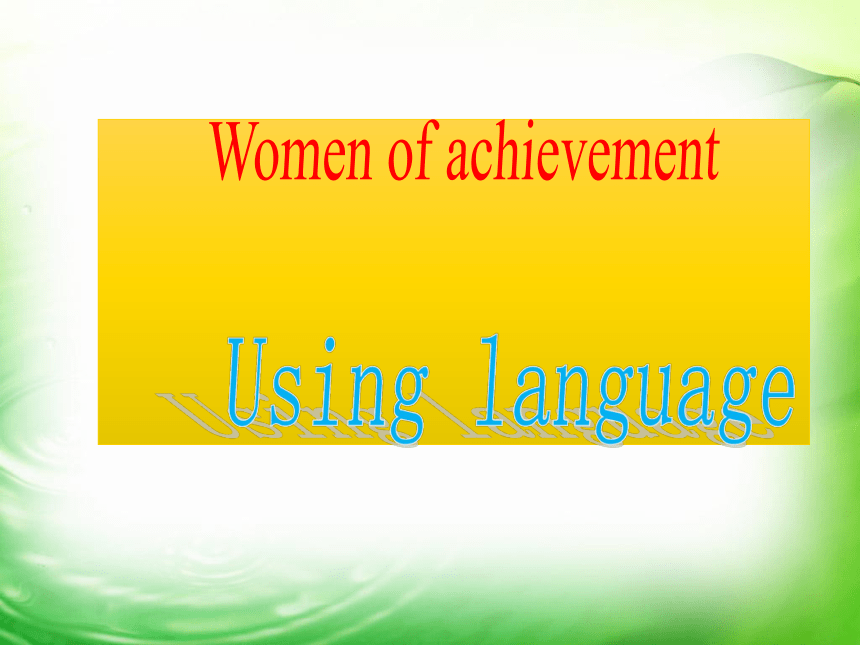
|
|
| 格式 | ppt | ||
| 文件大小 | 747.0KB | ||
| 资源类型 | 教案 | ||
| 版本资源 | 人教版(新课程标准) | ||
| 科目 | 英语 | ||
| 更新时间 | 2020-10-01 00:00:00 | ||
图片预览

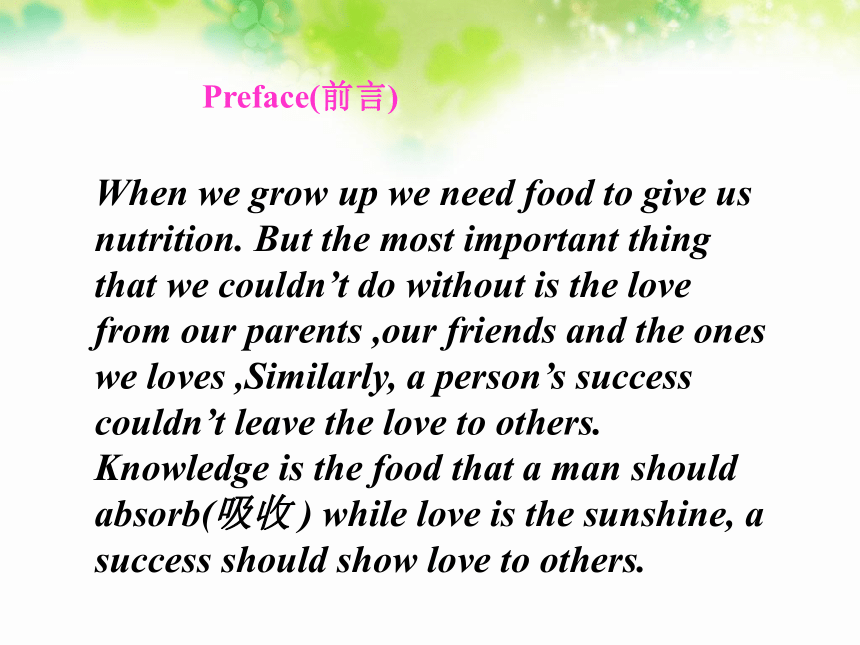
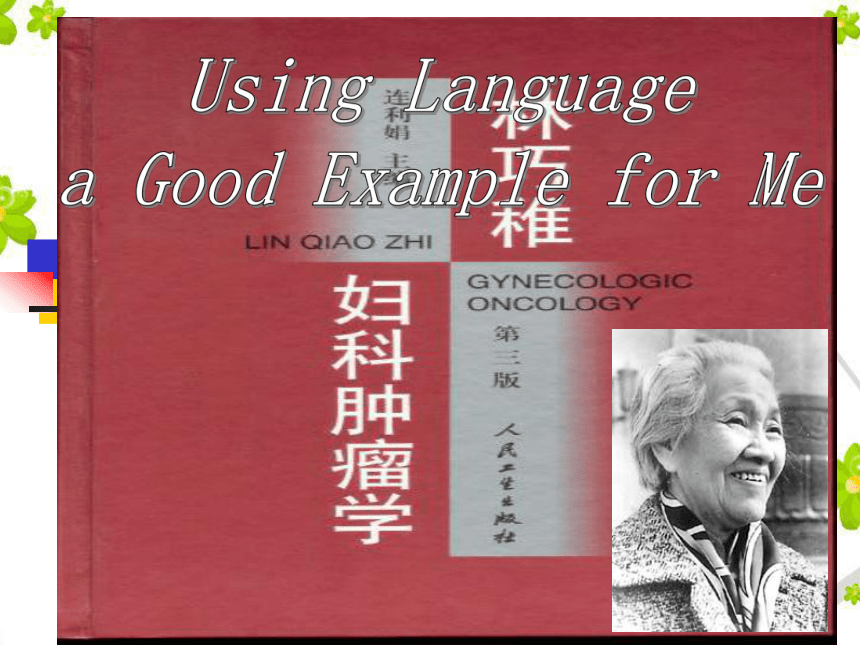
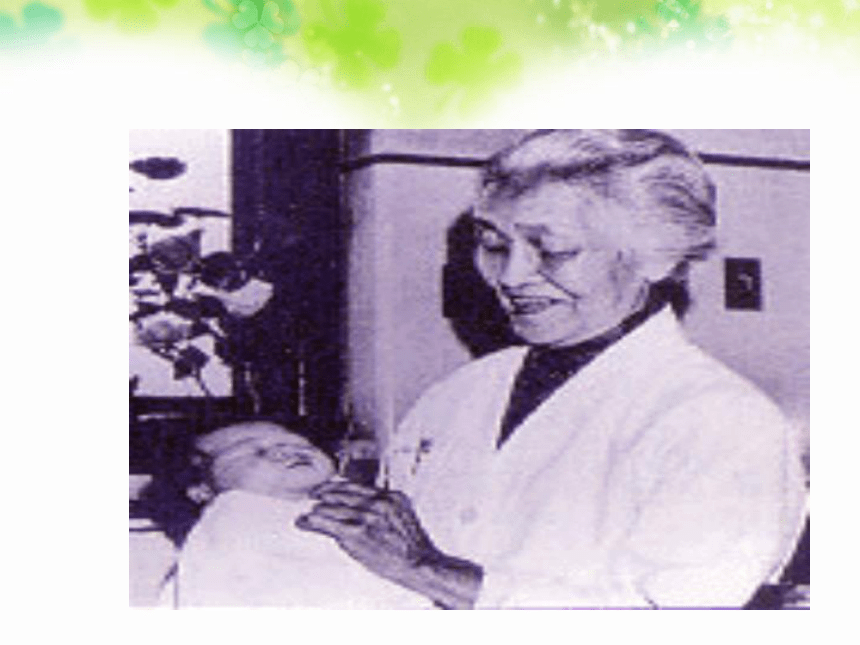
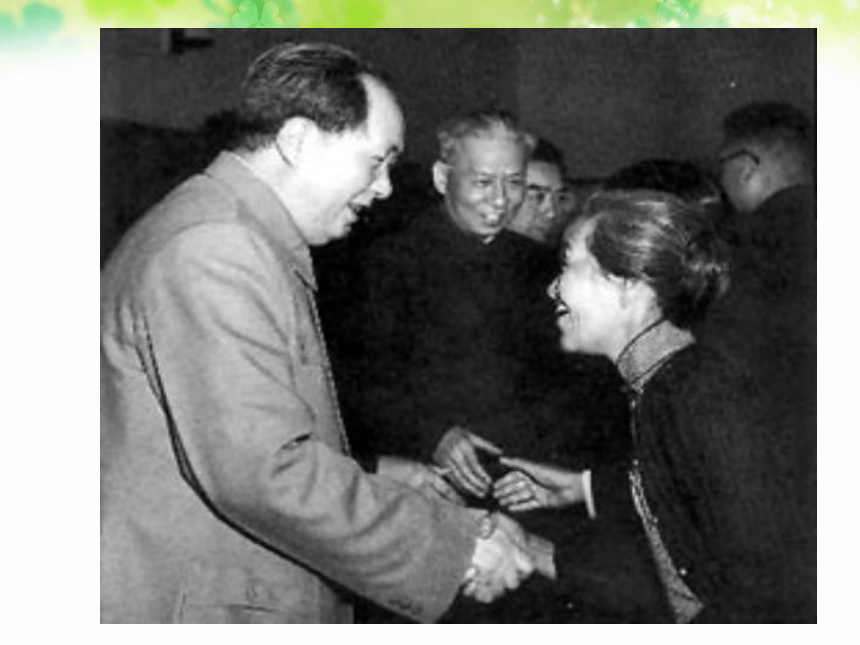
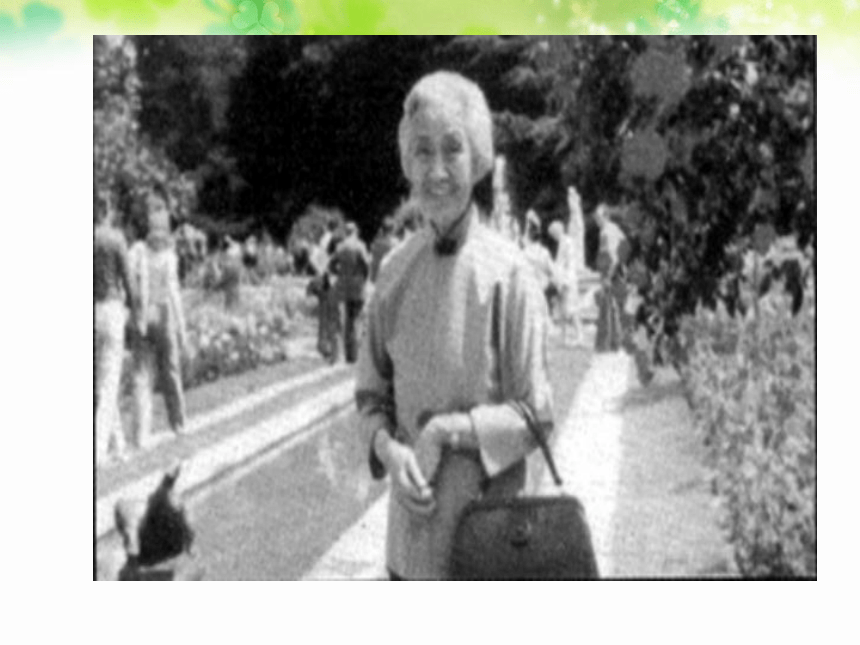
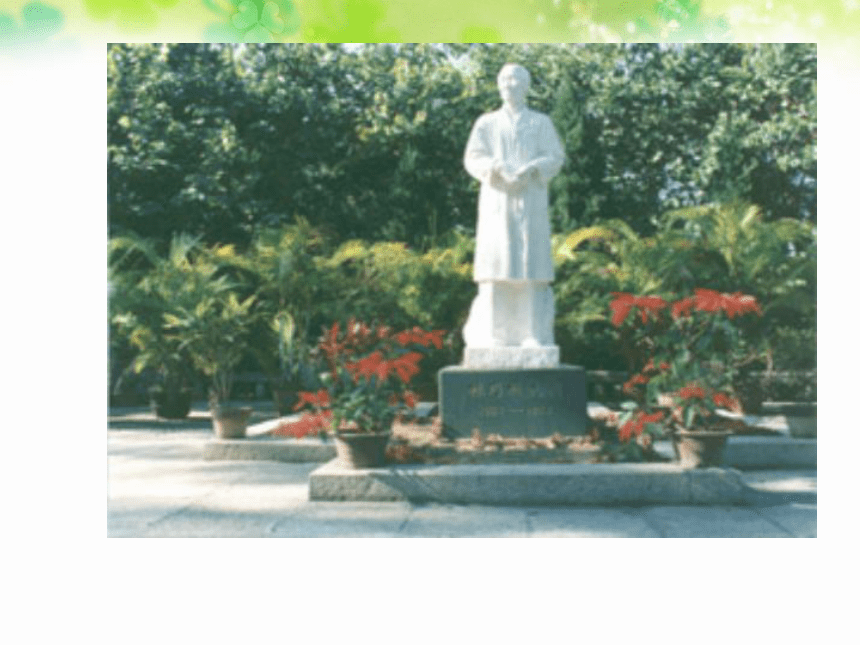


文档简介
When we grow up we need food to give us nutrition. But the most important thing that we couldn’t do without is the love from our parents ,our friends and the ones we loves ,Similarly, a person’s success couldn’t leave the love to others. Knowledge is the food that a man should absorb(吸收 ) while love is the sunshine, a success should show love to others.
Preface(前言)
Name:
Date:
Home place:
Occupation:
Work:
林巧稚
1901-1983
Xiamen,Fujian china
a specialist in women’s illness
妇科肿瘤学
Gynecologic oncology
Before the lesson please tell us something
about Lin Qiao zhi.
1.what was the writer’s problems?
2.what did he decided to do at last? Why ?
3. Which words can we find in the text used to describe Lin Qiaozhi ?
4. What are Lin Qiaozhi’s achievements mentioned in the passage?
Fast reading
What was the writer’s problems?
The writer did not know which subject to choose to study at university among English, biology and chemistry.
2.what did she decided to do at last? Why ?
She chose to study at medicial college, because she was moved by Lin Qiaozhi and wanted to help others just like Lin Qiaozhi.
3. Which words can we find in the text used to describe Lin Qiaozhi ?
hard work determination good nature
kindness consideration
1.write down three of Lin Qiaozhi’s achievements after reading the passage
a.---------------------------------------------
b.----------------------------------------------
c.----------------------------------------------------
She got a medical training for her career.
She became a specialist in women’s disease.
She had made sure that about 50,000babies were safely delivered to their mothers.
4. What are Lin Qiaozhi’s achievements mentioned in the passage?
Careful Reading
2. Answer the following questions
1.For whom and for what purpose did Lin Qiaozhi write a book about how to look after babies?
2.Which period did Lin Qiaozhi live in?
3.Was it easy for a woman to get medical education at that time? Give a reason.
She wrote a book for mothers in the countryside who were not able to get a hospital easily.
She lived in the early twentieth century.
It was not easy for a woman to get medical education at that time for education was for men first and women second.
4.What do you think are the important qualities a good doctor should have?
I think a good doctor should be kind,patient and have a good knowledge of diseases and ways of cures
Finish the summary.
One day,the writer did some on Lin Qiaozhi—a in women’s diseases.He found something about this great woman: she did her to study medicine and wrote a book for the women in the and all her life to her patients and medical career.She won from people.After getting this information,the writer decided to study at medical school and get training to help other people.
research
specialist
countryside
devoted
respect
medical
best
Do some research on sth.
Death rate
Get a medical training
Can’t wait to do sth.
Deliver a baby
Devote … to
做某方面的研究
死亡率
学医
迫不及待要做某事
接生
投身于……
Explain the following phrases.
Language points
1. was to change 属于 “be +不定式” 的结构,此处表示“不可避免的,命中注定的事”。
e.g. They were sure that he was to
become a very famous person.
还可以表示计划,打算
She is to go to Raoping tomorrow.
还可以表示命令,意为“必须,不得不”
e.g. You are to do your homework
before you have lunch.
In such dry weather, the flowers
will have to be watered if they___.
A. have survived
B. are to survive
C. would survive
D. will survive
B
It was a book explaining how to cut the death rate from having and caring for babies by following some simple rules for keeping babies clean and healthy.
现在分词做定语,修饰book, 相当与 一个定语从句 which explained how
一本介绍如何在妇女怀孕到护理婴儿的过程中,通过一些使婴儿保持清洁的简单规则来降低死亡率的书。
2. explaining
explain后接名词、代词、从句、wh-+to do作宾语。
She explained to us why she was late.
explain不能跟双宾语结构,
不能说explain sb. sth.
而只能说explain sth. to sb.
或explain to sb. sth.
3. Be intended for
解释“为……而准备, 预定”
e.g. The chair was intended for you
but she took it away.
4. Why not do sth
用来提出意见,解释为“为什么不……”
e.g. Why not ask for leave?
5. carry on (with) sth.
carry on doing sth.
解释为“进行……继续进行……”
e.g.
1. Carry on with your work while I’m away.
2. Carry on working while I’m away.
Preface(前言)
Name:
Date:
Home place:
Occupation:
Work:
林巧稚
1901-1983
Xiamen,Fujian china
a specialist in women’s illness
妇科肿瘤学
Gynecologic oncology
Before the lesson please tell us something
about Lin Qiao zhi.
1.what was the writer’s problems?
2.what did he decided to do at last? Why ?
3. Which words can we find in the text used to describe Lin Qiaozhi ?
4. What are Lin Qiaozhi’s achievements mentioned in the passage?
Fast reading
What was the writer’s problems?
The writer did not know which subject to choose to study at university among English, biology and chemistry.
2.what did she decided to do at last? Why ?
She chose to study at medicial college, because she was moved by Lin Qiaozhi and wanted to help others just like Lin Qiaozhi.
3. Which words can we find in the text used to describe Lin Qiaozhi ?
hard work determination good nature
kindness consideration
1.write down three of Lin Qiaozhi’s achievements after reading the passage
a.---------------------------------------------
b.----------------------------------------------
c.----------------------------------------------------
She got a medical training for her career.
She became a specialist in women’s disease.
She had made sure that about 50,000babies were safely delivered to their mothers.
4. What are Lin Qiaozhi’s achievements mentioned in the passage?
Careful Reading
2. Answer the following questions
1.For whom and for what purpose did Lin Qiaozhi write a book about how to look after babies?
2.Which period did Lin Qiaozhi live in?
3.Was it easy for a woman to get medical education at that time? Give a reason.
She wrote a book for mothers in the countryside who were not able to get a hospital easily.
She lived in the early twentieth century.
It was not easy for a woman to get medical education at that time for education was for men first and women second.
4.What do you think are the important qualities a good doctor should have?
I think a good doctor should be kind,patient and have a good knowledge of diseases and ways of cures
Finish the summary.
One day,the writer did some on Lin Qiaozhi—a in women’s diseases.He found something about this great woman: she did her to study medicine and wrote a book for the women in the and all her life to her patients and medical career.She won from people.After getting this information,the writer decided to study at medical school and get training to help other people.
research
specialist
countryside
devoted
respect
medical
best
Do some research on sth.
Death rate
Get a medical training
Can’t wait to do sth.
Deliver a baby
Devote … to
做某方面的研究
死亡率
学医
迫不及待要做某事
接生
投身于……
Explain the following phrases.
Language points
1. was to change 属于 “be +不定式” 的结构,此处表示“不可避免的,命中注定的事”。
e.g. They were sure that he was to
become a very famous person.
还可以表示计划,打算
She is to go to Raoping tomorrow.
还可以表示命令,意为“必须,不得不”
e.g. You are to do your homework
before you have lunch.
In such dry weather, the flowers
will have to be watered if they___.
A. have survived
B. are to survive
C. would survive
D. will survive
B
It was a book explaining how to cut the death rate from having and caring for babies by following some simple rules for keeping babies clean and healthy.
现在分词做定语,修饰book, 相当与 一个定语从句 which explained how
一本介绍如何在妇女怀孕到护理婴儿的过程中,通过一些使婴儿保持清洁的简单规则来降低死亡率的书。
2. explaining
explain后接名词、代词、从句、wh-+to do作宾语。
She explained to us why she was late.
explain不能跟双宾语结构,
不能说explain sb. sth.
而只能说explain sth. to sb.
或explain to sb. sth.
3. Be intended for
解释“为……而准备, 预定”
e.g. The chair was intended for you
but she took it away.
4. Why not do sth
用来提出意见,解释为“为什么不……”
e.g. Why not ask for leave?
5. carry on (with) sth.
carry on doing sth.
解释为“进行……继续进行……”
e.g.
1. Carry on with your work while I’m away.
2. Carry on working while I’m away.
同课章节目录
